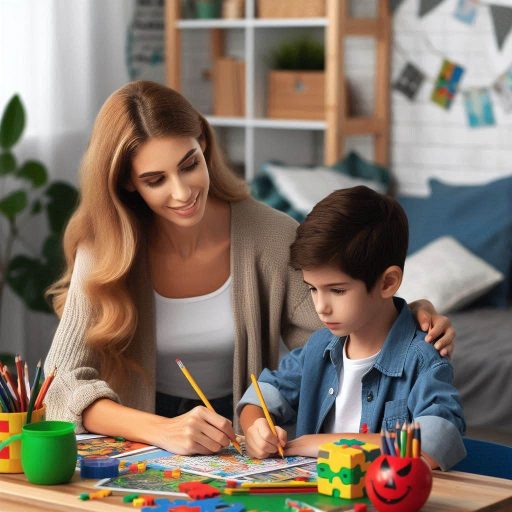Introduction
Educational therapy blends educational and therapeutic techniques to address learning challenges.
It supports students struggling with emotional and behavioral issues.
Addressing these issues in educational settings is crucial for student success.
Unresolved emotional and behavioral difficulties can hinder learning, leading to academic and social struggles.
Educational therapy offers targeted interventions that improve emotional regulation, behavior, and academic performance.
Educational therapists assess each student’s unique needs, creating personalized strategies that foster emotional well-being and positive behavior.
These strategies may include cognitive-behavioral techniques, social skills training, and stress management tools.
By addressing the root causes of emotional and behavioral issues, educational therapy promotes a supportive learning environment.
Students benefit significantly from educational therapy.
It helps them develop coping skills, build self-confidence, and improve their academic outcomes.
These improvements often lead to better peer relationships and increased engagement in school activities.
Teachers and parents also gain valuable insights into effective ways to support the student’s emotional and behavioral development.
In summary, educational therapy is a vital resource in educational settings.
It addresses emotional and behavioral challenges that can otherwise impede learning.
By providing targeted, individualized support, educational therapy enhances students’ emotional well-being, behavior, and academic success, fostering a more positive and productive educational experience.
Understanding Emotional and Behavioral Issues
Common emotional and behavioral issues seen in educational settings
- Anxiety disorders: Constant worry or fear that interferes with daily activities.
- Depression: Persistent feelings of sadness or hopelessness that affect functioning.
- Attention Deficit Hyperactivity Disorder (ADHD): Difficulty focusing, impulsivity, and hyperactivity.
- Oppositional Defiant Disorder: Defiance, aggression, and hostility towards authority figures.
- Conduct Disorder: Violating rules, aggressive behavior, and disregard for others’ rights.
Examples of how these issues can impact a student’s learning experience
- Anxiety can lead to difficulty concentrating and participating in class activities.
- Depression may result in lack of motivation to complete assignments or attend school.
- ADHD can cause challenges with organization, time management, and following instructions.
- Oppositional behavior can disrupt classroom dynamics and hinder learning for all students.
- Conduct issues can lead to disciplinary actions, suspension, and academic setbacks.
The need for specialized support in addressing these issues
- General educators may not have the training or resources to effectively help students with complex emotional and behavioral needs.
- Specialized interventions, such as counseling, behavioral therapy, and individualized education plans, are essential for success.
- Early identification and intervention can prevent academic failure, improve social skills, and promote overall well-being.
- Collaborative approaches involving teachers, parents, therapists, and school counselors are crucial for comprehensive support.
- By addressing emotional and behavioral issues proactively, students can have a better chance at academic achievement and personal growth.
Read: Collaborating with Teachers and Educational Therapists
Role of Educational Therapists
When it comes to working with students with emotional and behavioral issues, educational therapists play a crucial role in providing support and guidance.
Let’s delve into the responsibilities, qualifications, training, and importance of a multidisciplinary approach in educational therapy.
Responsibilities of Educational Therapists
- Educational therapists are responsible for assessing students’ needs and developing individualized educational plans.
- They provide academic support, teach study skills, and help students develop strategies to improve their learning abilities.
- Educational therapists collaborate with teachers, parents, and other professionals to create a supportive environment for students.
- They monitor students’ progress, adjust intervention strategies as needed, and advocate for students’ educational rights.
- Educational therapists also provide emotional support, guidance, and coping strategies for students dealing with behavioral issues.
Qualifications and Training Required
- Individuals aspiring to become educational therapists typically need a master’s degree in special education, counseling, or a related field.
- Additional certifications, such as Board Certified Educational Therapist (BCET), may be required for professional practice.
- Training programs for educational therapists often include coursework in human development, psychology, and education techniques.
- Practicum experiences and supervised internships are essential components of the training to gain hands-on experience working with students.
- Continuing education and professional development are crucial for educational therapists to stay current with best practices in the field.
Importance of a Multidisciplinary Approach
Collaboration and teamwork are key elements of providing effective educational therapy for students with emotional and behavioral issues.
A multidisciplinary approach involves professionals from various disciplines working together to address students’ diverse needs.
Transform Your Career Today
Unlock a personalized career strategy that drives real results. Get tailored advice and a roadmap designed just for you.
Start NowHere are some reasons why a multidisciplinary approach is essential:
- Each discipline brings a unique perspective and expertise to the table, resulting in a more comprehensive and holistic approach to intervention.
- Collaboration fosters a shared understanding of students’ challenges and strengths, leading to more targeted and effective interventions.
- Working as a team allows professionals to brainstorm creative solutions and tailor interventions to meet the specific needs of each student.
- A multidisciplinary approach promotes communication and coordination among professionals, parents, and other stakeholders involved in the student’s education.
- By incorporating insights and strategies from different disciplines, educational therapists can create a tailored intervention plan that maximizes the student’s potential for success.
In fact, educational therapists play a vital role in supporting students with emotional and behavioral issues.
By understanding their responsibilities, qualifications, and the importance of a multidisciplinary approach, educational therapists can effectively empower students to overcome challenges and thrive academically and emotionally.
Read: Educational Therapy and Its Role in IEP Meetings
Techniques and Strategies Used in Educational Therapy
Educational therapy offers a range of techniques to address emotional and behavioral issues in students.
These techniques are tailored to meet individual needs, ensuring effective intervention and support.
Different therapeutic techniques used in addressing emotional and behavioral issues
Educational therapists use diverse techniques to address emotional and behavioral challenges.
These include cognitive-behavioral strategies, mindfulness practices, and social skills training.
These methods help students identify and manage their emotions, fostering self-regulation and resilience.
By incorporating these techniques into sessions, therapists empower students to overcome challenges and develop healthier coping mechanisms.
Role of cognitive-behavioral therapy, play therapy, and other interventions in educational therapy
Cognitive-behavioral therapy (CBT) plays a crucial role in educational therapy.
CBT helps students recognize negative thought patterns and replace them with positive ones.
Play therapy, another essential intervention, allows younger children to express their feelings and experiences through play, facilitating emotional processing.
Additionally, social-emotional learning (SEL) programs equip students with skills to manage emotions, build relationships, and make responsible decisions.
These interventions, when combined, create a holistic approach to addressing emotional and behavioral issues in an educational setting.
Examples of successful strategies and their impact on student outcomes
One successful strategy is the use of social stories, which guide students in understanding social situations and appropriate behaviors.
For instance, a student struggling with anxiety may benefit from a social story that outlines steps for managing anxious feelings during school transitions.
Another effective strategy is positive reinforcement, which encourages desirable behavior through rewards and recognition.
These strategies have a significant impact on student outcomes, leading to improved emotional regulation, enhanced social interactions, and better academic performance.
Showcase Your Business Today
Reach thousands of readers actively exploring professional services. Publish your business profile and grow your audience now.
Publish NowIn summary, educational therapy utilizes a variety of techniques and strategies to address emotional and behavioral issues, fostering positive outcomes for students.
Read: Tools and Resources Used by Educational Therapists

Individualized Education Plans (IEPs) and Educational Therapy
How IEPs are developed for students with emotional and behavioral issues
IEPs are developed for students with emotional and behavioral issues through a collaborative process involving various stakeholders.
Educational therapists, teachers, and parents work together to identify the student’s strengths and needs.
Assessment tools are used to gather information on the student’s academic, social, and emotional functioning.
Goals and objectives are then created based on the assessment results to address the student’s specific needs.
Educational therapists play a crucial role in providing strategies and interventions to support the student’s development.
Collaboration between educational therapists, teachers, and parents in creating and implementing IEPs
The collaboration between educational therapists, teachers, and parents is essential in creating and implementing effective IEPs.
Educational therapists offer their expertise in understanding the impact of emotional and behavioral issues on learning.
Teachers provide valuable insights into the student’s academic performance and classroom behavior.
Parents contribute their knowledge of the student’s home environment and unique characteristics.
Working together, these stakeholders ensure that the IEP is tailored to meet the student’s individual needs.
Benefits of incorporating educational therapy into the IEP process
Incorporating educational therapy into the IEP process offers several benefits for students with emotional and behavioral issues.
Educational therapists can provide specialized interventions to target specific challenges that the student may face.
Therapeutic techniques, such as cognitive-behavioral strategies or social skills training, can be included in the student’s IEP.
Regular monitoring and adjustment of the IEP ensures that the student’s progress is continuously evaluated and interventions are modified as needed.
Collaboration between all stakeholders fosters a holistic approach to supporting the student in various settings.
Overall, the integration of educational therapy into the IEP process enhances the effectiveness of interventions for students with emotional and behavioral issues.
Read: Impact of Educational Therapy on Student Confidence
Benefits of Educational Therapy
When it comes to addressing emotional and behavioral issues in students, educational therapy has proven to be a valuable tool.
This specialized approach focuses on providing tailored interventions to help students overcome challenges and reach their full potential.
By teaching coping mechanisms and strategies for managing emotions, educational therapy empowers students to regulate their feelings and navigate stressful situations more successfully.
Positive Outcomes of Utilizing Educational Therapy
One of the key benefits of utilizing educational therapy for students with emotional and behavioral issues is the holistic approach that addresses the underlying causes of these challenges.
Rather than simply treating symptoms, educational therapy aims to identify and address the root causes of emotional and behavioral issues, allowing students to make lasting changes and improvements in their lives.
Improvement in Academic Performance
Students who receive educational therapy often experience significant improvements in their academic performance.
By targeting specific areas of need and providing personalized interventions, students can build essential skills, such as organization, time management, and task initiation, that are crucial for academic success.
Development of Social Skills
Another positive outcome of educational therapy is the development of social skills.
Many students with emotional and behavioral issues struggle with social interactions, which can impact their ability to form relationships and engage effectively with peers.
By incorporating social skills training into educational therapy sessions, students can learn how to communicate, cooperate, and collaborate with others in a positive and constructive manner.
Enhanced Emotional Regulation
Emotional regulation is a critical skill that enables students to manage their emotions and respond appropriately to challenging situations.
Through targeted strategies and techniques, educational therapy helps students develop emotional self-awareness, identify triggers, and implement coping mechanisms to regulate their feelings effectively.
This in turn empowers students to navigate stressful situations with resilience and confidence.
Success Stories and Testimonials
Countless students have benefited from educational therapy and have shared their success stories and testimonials highlighting the positive impact it has had on their lives.
Here are just a few examples of how educational therapy has helped students overcome emotional and behavioral challenges:
- “Before starting educational therapy, I struggled with focus and organization. Thanks to my therapist’s guidance, I have improved my study skills and now feel more confident in my abilities.” – Sarah, High School Student
- “Educational therapy has been a game-changer for me. I used to feel overwhelmed by my emotions, but now I have the tools to manage them effectively and stay calm in stressful situations.” – Alex, Middle School Student
- “Through educational therapy, I have learned how to communicate with my peers and form meaningful friendships. I no longer feel isolated and am more engaged in social activities at school.” – Emily, Elementary School Student
These success stories are a testament to the transformative power of educational therapy in helping students with emotional and behavioral issues overcome challenges, build essential skills, and thrive academically, socially, and emotionally.
Challenges and Considerations in Educational Therapy
Challenges Faced by Educational Therapists
- Educational therapists may encounter resistance from students with emotional and behavioral issues.
- Managing different learning styles and needs within a classroom setting can be overwhelming.
- Time constraints and heavy workloads can impact the effectiveness of therapy sessions.
- Communication barriers between therapists, educators, and parents can hinder progress.
- Dealing with complex emotional issues and behavioral challenges requires specialized training and skills.
Importance of Ongoing Professional Development
- Continuous learning helps therapists stay updated on the latest research and techniques in the field.
- Professional development fosters growth and enhances therapists’ ability to address diverse student needs.
- Training sessions and workshops provide opportunities for therapists to refine their skills and knowledge.
- Networking with other professionals can offer support, guidance, and new perspectives on therapy practices.
- Improving competency through ongoing education ultimately benefits the students and clients receiving therapy.
Ways to Overcome Barriers and Improve Effectiveness
- Establishing clear communication channels between therapists, educators, and parents is essential.
- Collaborating with other professionals, such as psychologists and counselors, can provide holistic support for students.
- Offering mentorship programs for new therapists can help them navigate challenges and build confidence.
- Implementing regular supervision and feedback sessions can enhance therapists’ performance and growth.
- Utilizing technology and resources to streamline therapy processes and improve efficiency.
In general, while educational therapy for emotional and behavioral issues presents various challenges, ongoing professional development, effective communication strategies, and collaboration with other professionals can help therapists overcome obstacles and enhance the effectiveness of their services.
By continuously improving their skills and knowledge, therapists can provide better support for students and contribute to positive outcomes in their educational journey.
Collaboration with School and Community Resources
Importance of Collaboration
School counselors, psychologists, and support staff play a crucial role in identifying and addressing students’ emotional and behavioral issues.
Collaboration ensures a holistic approach to student support, combining educational therapy with other school-based interventions.
Working together with school resources facilitates early intervention and promotes positive outcomes for students facing challenges.
Showcase Your Business Today
Reach thousands of readers actively exploring professional services. Publish your business profile and grow your audience now.
Publish NowRole of Community Resources
Community resources, such as mental health professionals, offer specialized support for students with complex emotional and behavioral issues.
Community partnerships can provide additional resources, expertise, and services to supplement school-based interventions and support networks.
Engaging with community resources helps create a seamless transition between school and external support systems for students in need.
Tips for Creating a Comprehensive Support Network
- Foster open communication and collaboration among school counselors, psychologists, teachers, and support staff to share information and resources effectively.
- Develop clear protocols and procedures for referrals to community resources, ensuring students receive timely and appropriate interventions.
- Establish regular check-ins and case conferences involving school and community stakeholders to monitor progress and adjust support strategies as needed.
- Encourage parents and caregivers to be actively involved in the support network, providing insights into students’ needs and coordinating efforts across settings.
- Promote a culture of inclusion and acceptance within the school community, fostering empathy and understanding towards students with emotional and behavioral challenges.
Conclusion
Educational therapy is a crucial intervention for addressing emotional and behavioral issues in educational settings.
It provides tailored support to help students overcome obstacles and reach their full potential.
By focusing on individual needs, educational therapy can lead to improved academic performance and overall well-being.
It is important for educators to recognize the value of incorporating educational therapy into their practice.
Students with emotional and behavioral issues can benefit greatly from this specialized form of support.
Ultimately, the goal of educational therapy is to empower students to succeed academically and emotionally.
Encouraging readers to explore the benefits of educational therapy can pave the way for positive change.
By seeking support for their students, educators can create a more inclusive and supportive learning environment.
Educational therapy plays a vital role in helping students with emotional and behavioral issues thrive in educational settings.
It is a valuable tool that can make a significant impact on the lives of students and educators alike.
[E-Books for Sale]
The Big Book of 500 High-Paying Jobs in America: Unlock Your Earning Potential
$19.99 • 500 High-Paying Jobs • 330 pages
Explore 500 high-paying jobs in America and learn how to boost your career, earn more, and achieve success!
See All 500 High-Paying Jobs of this E-Book
1001 Professions Without a Degree: High-Paying American Jobs You Can Start Now
$19.99 • 1001 Professions Without a Degree • 174 pages
Discover 1001 high-paying jobs without a degree! Unlock career tips, skills, and success strategies for just $19.99!




